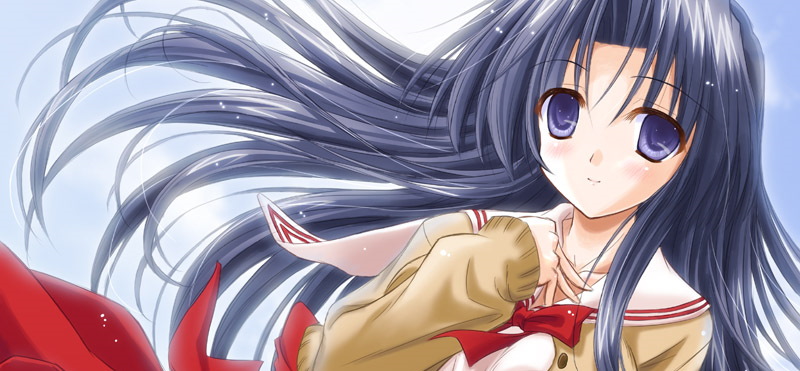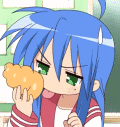
Toru Honda boasts he is the archetypical otaku. A single guy, he lives alone in Nakano
Ward, Tokyo. Fashion bores him. He buys his clothes exclusively from Uniqlo. His shoes
cost 1,000 yen.
Honda splits his time between the Nakano Broadway shopping mall and Tokyo's Akihabara
district. The nearby locale features shops selling video game figurines; the latter is
the premier otaku oasis.
A 35-year-old freelance writer, Honda spends almost all his money on his otaku hobbies.
He has eight DVD recorders. He can record up to 30 hours worth of animation a day. He
bought a 45-inch LCD TV for 900,000 yen to watch his fantasy friends in delicious
detail.
Honda has no girlfriend. He says he can't remember the last time he talked to a woman,
excluding the 80-year-old owner of his apartment building.
He would be satisfied with his peaceful existence but for the public's tendency to turn
up its collective nose at otaku. He says otaku are almost considered "untouchables" in a
society that defines love as the most noble of human emotions.
Not so, he says. Love is dead. What remains is moe-the intense affection players develop
toward their favorite animated characters.
Moe is the saving grace of the otaku. It never flirts; it never calculates-it offers
perfect uncalculated love. Moe is, above all else, self-sacrificing; it asks nothing in
return.
Based on this near-religious belief, Honda began to defend the otaku lifestyle on his homepage in the spring of
2004.
His book "Denpa Otoko" (Radio wave guy) was published in March, making him a
hero to his otaku comrades. For 405 pages, Honda makes the case that the otaku life is
superior to the run-of-the-mill existence. Moe, he says, is essential for peace in the
world.
Now in its fourth printing, "Denpa Otoko" had sold 33,000 copies by the end of May.
In addition to picking up royalty checks, he's received a slew of e-mails from guys like
him. Most say his book gave them courage and validated their way of life.
"I stopped counting the e-mails after they topped 100," he said during an interview in
Akihabara earlier this month.
The interview with Honda came the day after a 24-year-old man from Sapporo was arrested
for allegedly confining and assaulting a teenage girl. His apartment was crammed with
games and animation videos. He allegedly insisted his victims call him "master."
This appellation is used by waitresses-clad in black skirts and white aprons-when
addressing patrons at some extreme "maid cafes."
Sipping cafe au lait at one of the longest-operating maid cafes in Akihabara, Honda
distanced himself and his brethren from the suspect.
"Real otaku know the difference between the two-dimensional world and the real world.
Otaku are tame as sheep."
The title of his book, "Denpa Otoko," resembles that of another book "Densha Otoko." The
latter originated on popular Internet bulletin board 2 Channel. Once turned into book
form, it soon became a best-seller and the movie version will open today.
According to the story, an otaku wants to get to know a woman he encountered on the
train. He solicits romantic advice from bulletin board participants and keeps them
apprised of his progress. The story has a happy ending, of course. The geek gets the
girl and reaps the congratulations of his online advisers.
The predictable story irritates Honda. He says the heart-warming ending is not an otaku
victory, but rather a failure.
"(Densha Otoko) is an otaku's surrender to 'love capitalism.' What the main character
should've done is turn the girl into another otaku and bring her to Akihabara," he
says.
Honda's editor, Shun Saito, agrees, "The supporters of 'Densha Otoko' cheered as their
hero stopped being an otaku. But is being otaku such a bad thing? Aren't we supposed to
be proud of otaku? That's the message 'Denpa Otoko' offers."
"Since the 1980s, love has become a consumption item," Honda writes in his book. "Men
spend money on women. Women buy things with the money they get from men.
"So the guys like me who are not good looking and not willing to spend money are
considered losers."
Around the same time as love became "a consumption item," according to Honda, games like
"Tokimeki Memorial" or "To Heart" were released that allow players to fall in love with
the characters.
Those games brought salvation for otaku. Unpopular with girls, they let them live out a
goodly portion of their lives in the moe world-taking their favorite animation or video
game characters to heart.
Honda employs the terms "three-dimensional" and "two-dimensional" love. The former is
the real thing, the latter the otaku-game character relationship.
Honda might be said to be avoiding relationships with women, but he is even harder on
himself. In self-deprecating moments masked in sarcasm, he says his ugliness and
otakuness leave him "handicapped" in the love hierarchy of the real world.
With Honda it is difficult to tell where reality ends and fantasy begins. In the book,
he says his need for moe-pure love-is the result of a traumatic childhood in Kobe.
He writes that his mother, as the first daughter of the family, was forced to marry a
man who agreed to be adopted into her family.
However, the husband-Honda's father-turned out be a wife-beater who eventually abandoned
his family for another woman. Later, Honda learned that his father had also been
abandoned by his father, thus acting out learned behavior as an adult.
How deeply Honda's fantasy world is ingrained is hard to tell. At any rate, he writes
that his mother ran a cabaret to support her aged parents and her two children. Due to
the tough times, she developed cancer before she turned 40.
Bedridden and in agony, she told her son that she had been forced to marry someone she
did not love. Her life had been huge failure, she said.
Honda says he listened horrified-hearing a tale that seemed to deny his very
existence.
Worse, he states in the book, his man-hating mother raised him as a girl and always
objected when he made friends with girls.
When he turned 16, Honda realized that his family environment was far from the norm.
Ostracized at school, he tried to commit suicide, but his mother got in the way
again.
Finally, Honda withdrew into his tiny room, endlessly watching TV animation programs.
Attractive girls were characters in many of the stories. The standard plot put them in a
difficult situation from which the babes eventually emerged triumphant.
"I began to create an imaginary world; a world of two dimensions where only I and
animation characters existed."
Honda dropped out of high school and shut himself up in his room with his imaginary
companions.
After his mother died, he used her life insurance money and entered cram school. He
picked up a certificate that allowed him to enter university.
He was admitted to prestigious Waseda University and moved to Tokyo in 1988.
He says he thought he could start a new life in a new environment, but soon came to the
arguable conclusion that women only go for guys who are either handsome, have money or a
nice car.
After graduation, he worked at a publishing house for nine months and then quit. He
returned to Kobe. His luck remained the same-the Great Hanshin Earthquake in 1995 left
his house in rubble.
Scarred by the catastrophe, Honda thought death might be a relief. But his animated
games and his pixelated girlfriends helped him through the ordeal.
"Again, those moe characters saved my life, whether I wanted it or not."
Many newspaper articles and books like "Makeinu no Toboe" (Underdog howls) discuss the
difficulty Japanese women have in finding boyfriends now that so many men are holed up
in their rooms seemingly content with their animated fantasies.
The theory angers Honda. In his book, he says, in effect, that he had no choice in the
matter. "I never hit women. But I know I might have a penchant for violence in my blog.
If I were to have a peaceful life not hurting anyone, I had to stay home and live my
life in my imaginary world. But women are saying that this lifestyle is
unforgivable."
He says his indignation at this mischaracterization of otaku prodded him to write his
book. He felt otaku needed someone to tell their side of the story-of harmless
individuals seeking love in an imaginary world only to be labeled misfits by
society.
Badly disappointed with the "three-dimensional world," Honda has created his own fantasy
family. One of his younger sisters is a chimera of his own making. The rest-a wife, two
other younger sisters and a maid-were all borrowed from animation games.
It may sound like a solitary life. But Honda, while admitting he is not a social
creature, says he is not lonely.
He doesn't recommend every otaku follow his path, because "you lose a lot of things."
The warmth of another human being?
"No, money," he says, referring to the financial burden incurred in supporting his
virtual family. (IHT/Asahi: June 4,2005)










